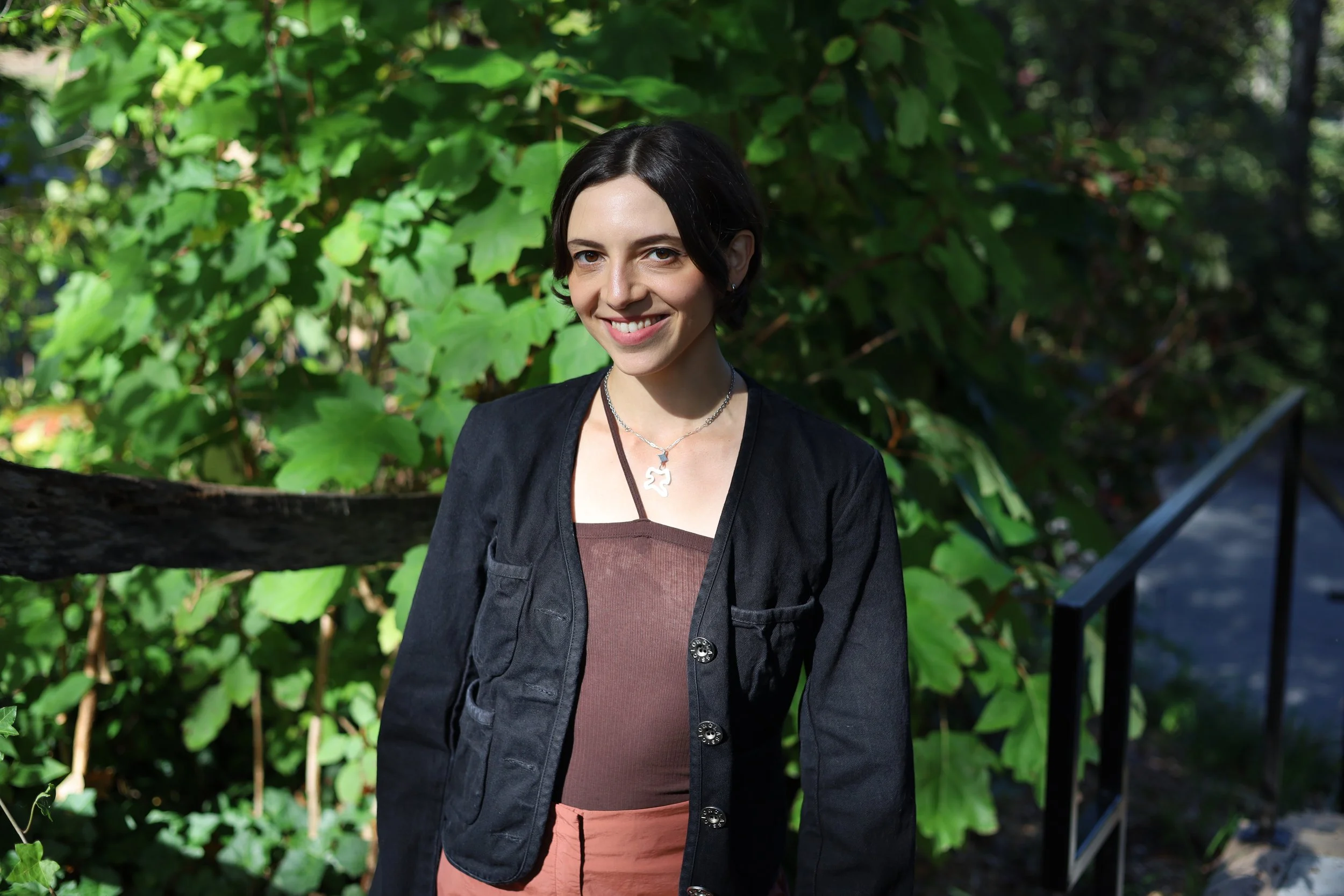Sarah Sgro Loves Trash
Ryleigh Johnson | October 7, 2025
Visiting assistant professor Sarah Sgro poses for a picture outside of Jensen Hall at Warren Wilson College in Swannanoa, N.C.. (Echo/Neko Heinrich)
Sarah Sgro, Warren Wilson College’s (WWC) visiting assistant professor of English and communication, likes thinking about refuse in all its forms.
“I found myself becoming just really interested in waste and the politics of waste, as the stuff that doesn't belong in a poem,” Sgro said. “Like, why would you write a poem about poop?”
This interest is at the center of the First-Year Seminar (FYS) Sgro is currently teaching at WWC, “Reading, Writing, and Remaking Waste.” In the class, students have considered the politics of waste and its disposal, along with volunteering for Asheville GreenWorks’ Hard to Recycle program. Sgro is dedicated to exploring the ways waste can be an entry point into considering a variety of topics, from systemic racism to the degradation of digital spaces.
“[My initial interest] just sort of grew into more of a critical interest in waste...thinking about waste as marginalized matter, thinking about communities as disposable and things like environmental racism [and the] disproportionate effects of waste management practices on vulnerable communities, and also, in particular, the field of digital waste,” Sgro said. “How [do] those politics of waste surface in everything from like electronic waste to data waste and now AI internet slop?”
Sgro began her love affair with waste during her MFA program at the University of Mississippi. Born and raised in New York state, the program marked the first time Sgro had lived outside of the northeast. It was there that Sgro began to flourish creatively, largely because of the community she found in her program.
“I still look back and it feels like a fever dream in terms of how lucky I was to constantly be surrounded by people who were writing, [who were] constantly encouraging me to write,” Sgro said. “I felt that the aesthetic in my program was extremely diverse. I was always being inspired by very different kinds of writing.”
This exposure to different forms of writing made a marked impact upon Sgro, who began to explore literary approaches outside of her traditional medium of poetry.
“I found myself [being] very interdisciplinary,” Sgro said. “During my MFA, I felt like my writing was informed by an early modern literature class I was taking. Partially because of the time of my coursework and teaching, partially because it was a different sort of program, I found myself really exploring other genres. Now I feel like I'm just as much of a fiction writer, or a critic, as I am a poet.”
This interdisciplinary approach has been welcomed at WWC, where Sgro’s classes incorporate elements of creative writing, poetry and critical theory.
“Students come to Warren Wilson for very interesting reasons…” Sgro said. “I think it makes me a better teacher to really engage those reasons and interests head on in new ways in the classroom. I have students that come to my waste class because they're really interested in theory...I have students that come here...and...they're really interested in sewing and mending or woodworking. That's something that animates me, to bring those things into the classroom.”
This interdisciplinary focus is also a driving force behind Sgro’s hopes for what she could bring to the school in the future. Sgro is currently working as a visiting professor with the possibility of an extended contract, which she would welcome. Should she be hired for a more permanent position, Sgro is interested in beginning a formal Queer studies program at WWC, along with working alongside the Queer Resource Center (QRC) on campus.
“I see a need for bringing faculty together around some sort of really [dedicated] Queer studies certificate or program,” Sgro said. “There's been a lot of talk of moving the Queer Resource Center from Sunderland to Jensen [Hall, where the humanities departments are located], and just having more communication and collaboration between people who are doing this [work]. I think the students here deserve that sort of space and deserve that sort of attention, given how much Warren Wilson seems to celebrate its queer student body.”
For now, Sgro is excited to continue connecting with students and exploring the area. She hopes that being in a creative community like Asheville will enable her to continue exploring her own artistic expression.
“I haven't been writing poems as much as I used to, and I'm trying to change that,” Sgro said. “That's one of the things [I was hoping for when] moving to Asheville. Poetry will always be so important to my creative practice.”
Sgro will be teaching three classes for the spring 2025–26 semester: one focused on the variety of critical lenses used to approach literature, a special topics course on digital activism co-taught with media and communications department chair Beck Banks and an upper-level class on 20 and 21 century female poets. No matter what the topic, she welcomes her students to bring their own passions and interests to the academic arena.
“I think there's a lot of ways that we can define and access knowledge,” Sgro said. “I want to make [my classes] spaces for as many routes to knowledge...as possible, whether that's experiential learning or creative writing...I would like to invite students in my classes to maybe enter curiously, without expectations, and also feel invited to make it into something that matters to them by actually bringing to the class the things that they want to do in this world. It’s going to make the class better.”


